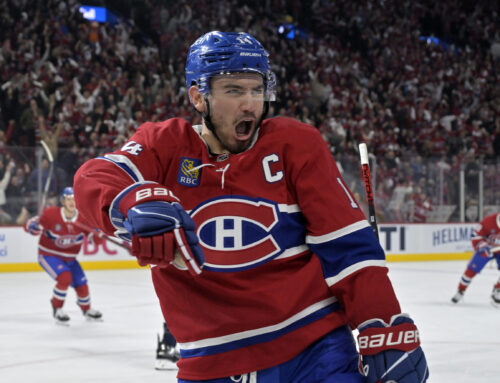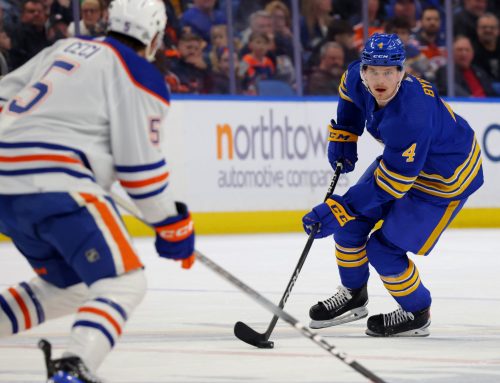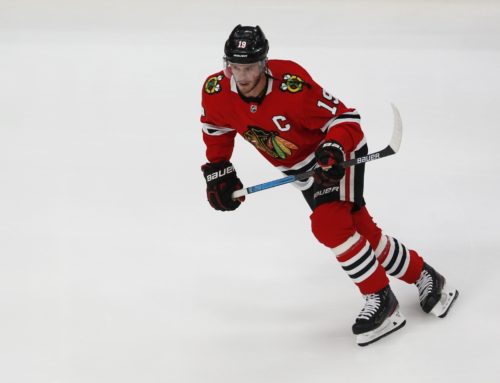
Earlier this week I discussed the importance of goals-for percentage as it relates to future playoff success, specifically citing a 52.5% GF% as the cut-off for true contender status. This led to a good discussion about strength of schedule and how it might relate to a team’s ability to clear that cut-off, specifically looking at the disparity in talent between the Atlantic and the Metro divisions.
I really don’t believe that strength of schedule has much impact. The parity in the league is to the point that anyone can win on any given night. Look at ESPN’s strength of schedule metric. There’s barely any disparity between teams. Even though Boston, Toronto, and Tampa Bay will have played extra games against bad teams at the bottom of their division, they’ll also have played each other more often. Plus, Florida is no longer a joke.
You can use all sorts of anecdotes to prove your point one way or the other. At the end of the day, everyone is beating up on the Atlantic. An extra game here or there hasn’t made a big difference. Want something palpable? Look at how the Atlantic’s top teams have fared against the West, compared to how the Metro’s best have fared. That’s where the real disparity lies.
Bottom line, you can only beat the team that is in front of you. Consistently doing so over the course of 82 games is how you prove yourself a true contender. The Atlantic’s best have done it. The Metro’s best haven’t as yet.
*
While we are on the topic of playoffs, Travis Yost had an interesting piece on the importance of regular season head-to-head performance for predicting playoff outcomes. I looked at head-to-head record when I did my deep dive on playoff outcomes a few years back but didn’t derive the same predictability as I did from goal differential, so I dropped the idea. Yost’s article digs much deeper:
The tricky part is that we’re looking at only a handful of games, which means relatively small samples of data. To really tease out how teams have performed against one another, we can look at two varying measures – the percentage of total scoring chances in a team's favour and the percentage of total goals in a team's favour.
It’s an interesting idea, and I wondered how head-to-head scoring chance percentage has done over the past few seasons in terms of predicting outcomes of playoff series. As it turns out, not particularly well. Teams that held a scoring chance advantage through their regular season matchups won only 55% of their playoff matchups. That’s better than nothing, but not better than what goals-for differential can do.
*
Explosive return to the lineup for Jake DeBrusk who rejoined the second line with David Krejci and red-hot Ryan Donato. DeBrusk and Krejci both notched three points, while Donato had two to run his point total to seven points in seven games.
The Bruins have seemingly endless waves of young talent to throw at opponents. They’re the team I’ll try to load up on in playoff pools. It may prove challenging to land more than one guy off their top line, but you could likely corner the market on their depth options if you are willing to reach a little.
Brandon Carlo had to be stretchered off after this fall:
Brandon Carlo lands awkwardly on his left ankle and gets stretchered off the ice pic.twitter.com/lcISiyxbW2
— Pete Blackburn (@PeteBlackburn) March 31, 2018
Either Carlo is Gumby or his season is done. Indeed, it appears that Carlo is out indefinitely with a broken leg.
The Bruins also lost Riley Nash after taking a shot to the head.
*
The Wild lost Ryan Suter to a leg injury as well:
Ryan Suter's foot goes into the boards awkwardly. He needed to be helped off the ice. #mnwild pic.twitter.com/Q2G79preAv
— Giles Ferrell (@gilesferrell) April 1, 2018
This one doesn’t look quite as bad but could really hinder their playoff hopes if Suter is diminished or misses any time. With Jared Spurgeon already out, you’re looking at losing the entirety of a top pair that consistently chewed 25+ minutes a night.
*
Taylor Hall is awesome, but also the Islanders’ defense is terrible:
🔥 @hallsy09 pic.twitter.com/C8XXccTKao
— NHL GIFs (@NHLGIFs) April 1, 2018
*
26 saves on 30 shots and a win for Thatcher Demko in his NHL debut. Demko has boasted some solid numbers in the AHL this season, boasting a .921 save percentage.
After two years in the minors you have to figure that Demko is ready to take another step. If the Canucks were closer to seriously competing perhaps it would make sense to bring Demko up sooner, but since they aren’t he’d be better off continuing to get regular action in the AHL than making the Canucks as a backup next season. However, as we have seen in Colorado and New Jersey teams can turn around faster than you might think so perhaps he could get dragged up by mid-season next year.
*
One assist for Casey Mittelstadt in his debut. He skated 14 minutes centering the third line and second PP unit. Not a bad spot, but not a great one either.
A hat-trick for Sam Reinhart gives him 34 points in the last 34 games, which all kicked off after the Sabres’ bye week. A big reason for his second-half tear has been the Sabres’ rediscovery of power play excellence. 14 of Reinhart’s points in this run have come with the man-advantage, helping him to career highs in PP goals (11) and PP points (20). A full season of PP production like this could lead to a breakout, but we also said that last season.
Five assists for Jack Eichel vaulting him to a new career high with 62 points. Amazing that this is a career high since he’s nearly been a point-per-game guy for two straight years. Those pesky injuries will catch up to you, however.
*
No points or shots even for Eeli Tolvanen in his NHL debut. He skated 13:34 getting a cameo on the top line with Filip Forsberg given the night off. Tolvanen might stick on that top line if Viktor Arvidsson’s injury proves serious, as the forward was forced from last night’s game.
*
Tough times for the Avalanche:
Semyon Varlamov has a lower body injury and is out for the season.
— Colorado Avalanche (@Avalanche) March 31, 2018
Erik Johnson has a fractured patella and is out six weeks. pic.twitter.com/o7TIcLyDnW
This is not the first time they have been forced to weather injuries to Semyon Varlamov and Erik Johnson, but it nonetheless makes their task ahead more challenging. Even if they survive to make the playoffs they’ll be in tough without these vets.
*
Interesting look at how today is the golden age for ironman streaks in the NHL:
Four of the 10 longest streaks in NHL history were active at the start of the 2017-18 season. Anaheim Ducks forward Andrew Cogliano's streak ended at 830 games earlier this season — because of suspension — and Pittsburgh Penguins winger Phil Kessel is fast approaching 700 consecutive games, too. Meanwhile Montreal Canadiens defenseman Karl Alzner comes in at 12th all time, with a streak that hit 600 consecutive games earlier this season.
Keith Yandle and Patrick Marleau are the other two guys with active streaks among the 10 longest in history. It’s certainly a boon to the fantasy value of Yandle, Marleau and Kessel that they don’t miss games.
I don’t know that the league is changing to make it easier for these guys to accomplish these feats. Of all the arguments made in this piece, what was missed was expansion. The player pool being so much larger increases the odds of having multiple outliers. At the end of the day, that’s what these guys are: outliers.
*
Jeff Veillette had the most thorough and important piece on the MVP discussion that you’ll find:
This lines up with the trope we all know, that a goaltender is the backbone of a hockey team. They can steal you wins on bad nights and cost you points on good ones, and everything in between; so much of the score, and in the long term, the standings, relies on how they stop the puck.
So, if you really believe that the Hart Trophy needs to stay strict to the Most Valuable Player To Their Team definition, and you believe that playoff status is key to this argument, we should probably throw skaters out of the conversation entirely. Goalies dominate in this regard; you’re basically looking at the GSAA leader, or the goalie with the highest GSAA that keeps their team from going into a negative goal difference (or, a worse one if they have one already).
Everyone has their own criteria to define value, but if you take a literal approach, goalies have the most impact on the game. They are the only players to play all 60 minutes and have a direct hand in controlling just how many goals the opposition can score. I prefer an abstract approach, but I think you have to acknowledge the import of goalies before you can make any other argument.
*
Thanks for reading! You can follow me on Twitter @SteveLaidlaw.
3 Comments
Leave A Comment
You must be logged in to post a comment.





 PHI
PHI ANA
ANA VAN
VAN DET
DET BUF
BUF NYR
NYR MIN
MIN NYI
NYI

I would argue almost the exact opposite. NHL goalies are a reflection of the players in front of them. Is Price a good goalie or a bad goalie? Playing behind this group of D that was bad with Weber but brutal with out not to mention the forward group is poor & Mon sits -52 as I right this in goal differential.
Yes goalie’s can steel games & or lose them but the difference between the leagues best & almost worst as Darling is in a league of his own for what were supposed to be starters for me is a very fine line. A starter needs to play a minimum of 1/2 his teams games to be considered a starter for me; 41, unless a teams historical starter is lost to long term injury. Even a bad goalie can steal games or go on a run.
I could list endless examples but we’ll stay in the now, the last few seasons. Budaj looked like a stud playing as LA’s starter last season when Quuick missed most of the year, but he played behind 1 of the best defensive teams in the NHL, since? not very good. Schneider in NJ last season, although he has been terrible since returning from injury & NJ didn’t have the luxury to let him ride out his struggles he bounced back with an improved D & team. Lehtonen in Dallas for years was bad but posted solid #’s with an improved D & Hitchcock’s man on man defensive system, until thrust into playing every night as Bishop has a bad timing injury for what is it now his 3rd or 4 the time at the worst possible time.
I don’t want the best goalie especially at anything more than 5.5 mil per season, I want a very good goalie I don’t have to pay more than 5 mil a season ideally so I can max out my cap over my entire roister & ice a better overall team. In the real world give me a Dubnyk, Lehner, Talbot; yes Edm has been terrible, Luongo, Quick, Halak; a reflection of the teams defensive play in front of him, Anderson, Andersen, etc.
I can even live with the with the Crawford 6 mil, Rask 7 mil & Rinne 7 mil contracts as they were signed in a runaway cap world but wouldn’t pay them today. Well 6 mil would be the max but only on a very long term deal. I’m not paying Lundqvist & Price type monies for a goalie & if forced to 2 years max & if that meant I’m losing my goalie I’d look to trade him or allow to walk if confronted with no other choice. Taking the cap space saved & finding the best solution available come summer & there are always plenty.
The world is producing more than enough goalies to stock 31, soon to be 32 teams, you don’t need to pay 1 10 mil a year even the best 1’s.
Assessing the value of a goalie to their team is difficult. Numbers alone can be deceiving, so actually watching their performance throughout a season might be the only way to gauge their importance and the quality of the defence corps and PK forwards.
A mediocre goalie can rack up stellar numbers with D great at blocking shots and a great PK. I think the best way to assess the value of a goalie is their performance with a below-average defensive team, like how Hasek dominated even when playing for the Sabres during those rough years.
First time long time Steve. Taking the MVP a step further and equating that to fantasy hockey, my league starts 12 players with 16% being goalies on any given night counting for 27% scoring! That’s a hefty sum for two players on any given night. Just saying. However, with that said, drafting a goalie in the first or second round has .always been a risky strategy!